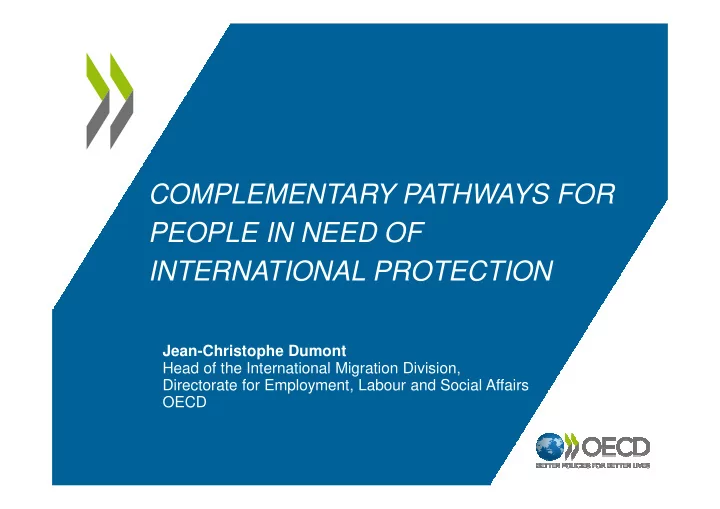

COMPLEMENTARY PATHWAYS FOR PEOPLE IN NEED OF INTERNATIONAL PROTECTION Jean-Christophe Dumont Head of the International Migration Division, Directorate for Employment, Labour and Social Affairs OECD
Ressetlement effort needs to be scaled up in the context of large movements of refugees Resettlement arrivals 120 Milliers 9 11 8 100 7 7 7 7 Grand Total 80 6 Other 80 67 60 73 66 71 60 66 51 United States 40 Canada 20 12 20 12 12 11 13 12 10 Australia 13 11 11 12 9 9 9 6 0
Complementary pathways for people in need of international protection Resettlement Alternative Humanitarian pathways Alternative general mobility pathways Target group of beneficiaries outside the country OECD (2016) International migration following environmental and geopolitical shocks: How can OECD countries respond?, International Migration Outlook OECD
Labour migration schemes
Three main approaches to facilitating refugee access to labour migration Solely help refugees to access existing labour migration channels • ⇒ Competing with the global pool of foreign talents ⇒ Access to information about legal opportunities and supply and demand (matching) ⇒ Help overcome administrative obstacles Create incentives for employers to recruit people under • international protection from abroad within the broad parameters of labour migration policies ⇒ Provide a preferential treatment (PBS, quota, minimum requirements) ⇒ Lower hiring costs for employers ⇒ Encourage recruitment under ethical recruitment and CSR grounds Draw up new labour migration programmes specifically for • refugees ⇒ Bilateral agreements
Private sponsorship schemes
NY declaration 2016 & State of the Union 2017 “79. We will consider the expansion of existing humanitarian admission programmes, possible temporary evacuation programmes, including evacuation for medical reasons, flexible arrangements to assist family reunification, private sponsorship for individual refugees and opportunities for labour mobility for refugees, including through private sector partnerships, and for education, such as scholarships and student visas.” “In addition, the Commission encourages Member States to set up private sponsorship schemes allowing private groups or civil society organisations to organise and finance resettlements in accordance with national legislation. To this effect, the Commission has invited EASO to coordinate a pilot project on private sponsorship schemes with interested Member States.”
Canadian resettlement programmes
The Canadian model for private sponsorship • Different types of sponsors – Sponsorship Agreement Holders (SAHs) – Group of Five (G5) – Community Sponsors • Favourable labour market outcomes • The global refugee sponsorship initiative
Assessing the potential of complementary pathways
Potential and feasibility Protection • How many people does the policy protect? • Who receives protection under the policy, who is excluded and why? • Acceptability • Economic and social consequences for the host country • Feasibility • Administrative capacities and financial resources • Adaptability of the domestic legal framework •
Use of complementary pathways for Syrians in the OECD • A joint UNHCR-OECD monitoring system
Lessons learnt and policy implications Effective international cooperation can be taken for granted in case of mass displacements Long term integration outcomes / durable solution Selection, which is a common feature of most migration systems, needs to be rethought in the context of international protection frameworks
14/11 Thank you for your attention For further information: www.oecd.org/migration jean-christophe.dumont@oecd.org
Recommend
More recommend